Allan McNish reveals the secrets and stories behind his illustrious career in the cockpit
From Dumfries to Monaco, Louise Simpson races over lunch with motorsports legend Allan McNish
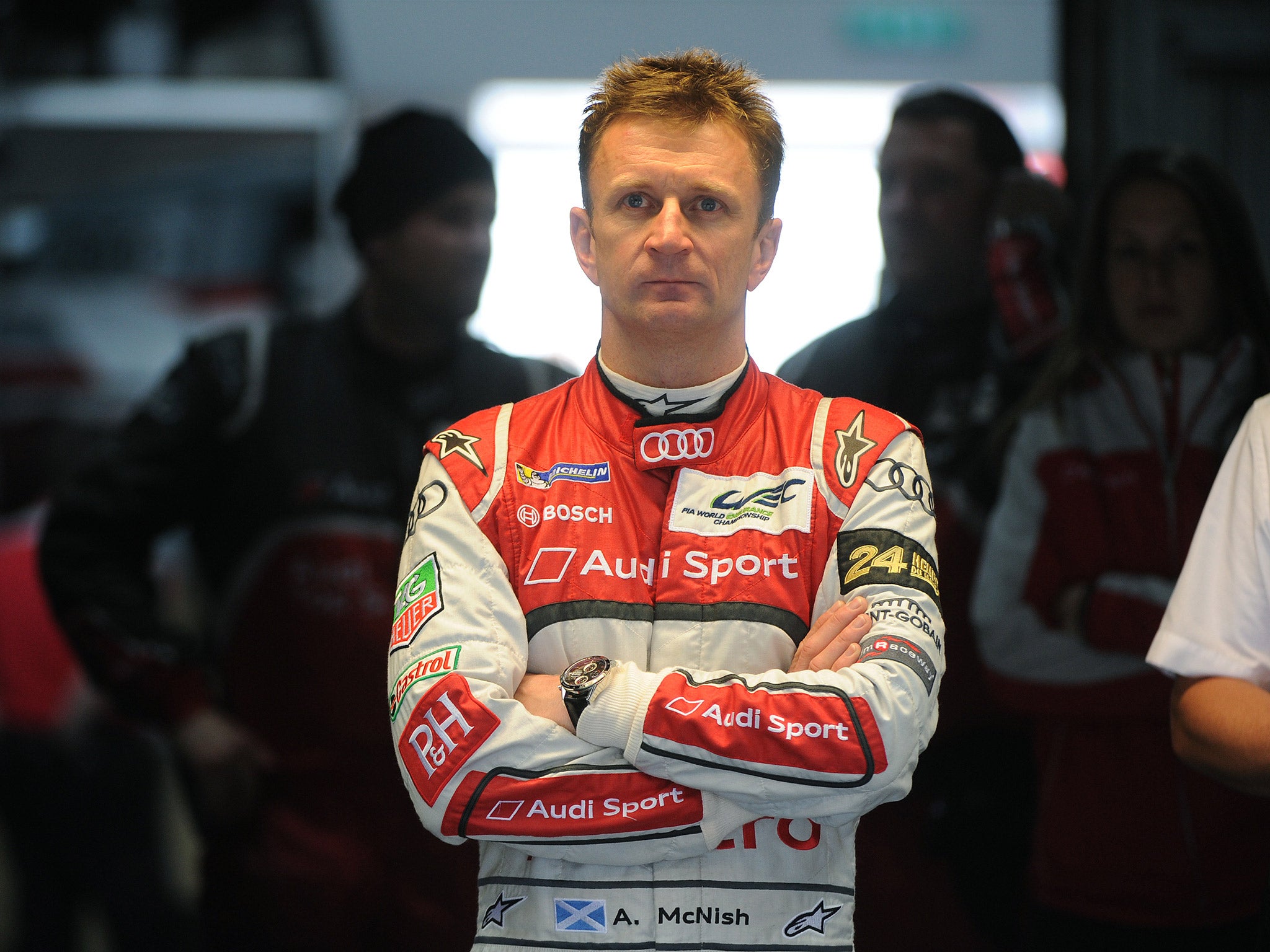
Your support helps us to tell the story
From reproductive rights to climate change to Big Tech, The Independent is on the ground when the story is developing. Whether it's investigating the financials of Elon Musk's pro-Trump PAC or producing our latest documentary, 'The A Word', which shines a light on the American women fighting for reproductive rights, we know how important it is to parse out the facts from the messaging.
At such a critical moment in US history, we need reporters on the ground. Your donation allows us to keep sending journalists to speak to both sides of the story.
The Independent is trusted by Americans across the entire political spectrum. And unlike many other quality news outlets, we choose not to lock Americans out of our reporting and analysis with paywalls. We believe quality journalism should be available to everyone, paid for by those who can afford it.
Your support makes all the difference.“It was one of those crawl-through-the-floor moments,” he remembers.
Perched on a wooden bench at the Son of a Bun burger joint, Allan McNish reveals his most embarrassing moment. It was at the height of his career in 2008 in Atlanta. On the way to the grid for the start of the 10-hour race, he shunts his car. It’s an amateur mistake for a world-renowned Formula One driver. By the time his car makes it out the pits, McNish is two laps down. He feels the pressure of the multi-million-dollar operation that has transported his car and his 60-strong team to America for a week. With characteristic grit, he turns his frustration to his advantage and overtakes the race leader with 30 minutes to go. At the end of the race, he phones his boss back in Germany: “I’ve won, but you’ve got a car in broken parts.”
A tanned and relaxed 46-year-old Monaco resident, McNish has come a long way from the young boy funding his karting competitions through selling racing gloves in his native Dumfries. I wonder how this tough Scot rose to international stardom. Three-time Le Mans 24 Hours winner, ex-Formula One driver, 2013 FIA World Endurance Champion: his racing accolades are endless. Was it gritty determination or was it something in the water in the small farming community where coincidentally both he and motor-racing ace David Coulthard were born?
“Winning is 100% in your head,” he says. “You have to understand how to deliver the killer blow.”
McNish grins wolfishly as he lists the emotional qualities that drove his rags-to-riches tale. Words like ‘ruthless’ and ‘self-centred’ feature. Noticeably absent are the clichéd racing epithets: speed and bravery. McNish dismisses speed as a given and bravery as the irrelevant sidekick of risk assessment.
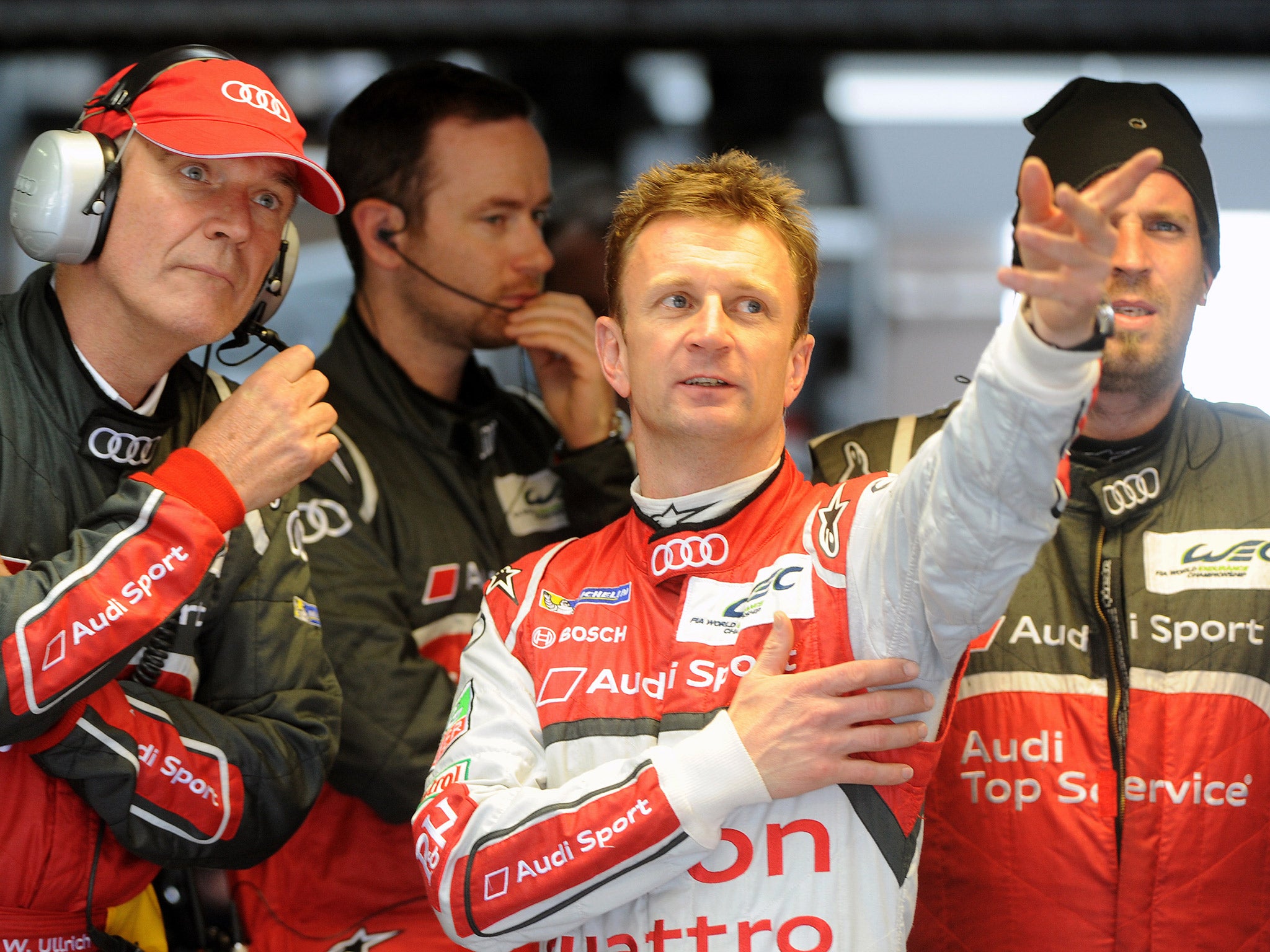
“The question is whether I would risk more than I could gain from going flat out around a corner,” observes McNish.
Then he lists the physical requirements. His legs withstood pressure on the brake pedal of over 100 kilos of force, while his arms carried 4 kilos of steering wheel pressure. His neck supported up to 32 kilos (the combined weight of his helmeted head and G-forces). That’s not forgetting the inevitable toll of his surging heart rate around 170 beats per minute for an extended period of time.
Next up was his ability to drive a car at 200mph without thinking about it so that he could focus on the car mechanics. In the data-free olden days, this meant memorising every detail on the track to report back to the engineer at the end of the race. Nowadays, data technology enables live data transmission every lap about car-system information. Hence the concentration has turned towards minute-by-minute adjustments of traction control, engine mapping and hybrid systems. McNish describes the subtle driver-engineer hierarchy where the driver bears the final responsibility to balance the engineer’s data readings against his own judgment.
“My relationship with my engineering team was like a marriage,” says McNish. “One year, I spent more time with my engineer than I did with my wife.”
Once he had mastered all the above skills, the decider lay in his man-management skills. A typical Formula One driver is the front face and leader of about 150 people. His ability to drive the development of the car and the team in certain directions was critical to his success.
“He wanted to go in one direction, I wanted to go in the other,” McNish remembers one apposite altercation with his engineer. “So I said, ‘Stand up against that wall and sell me the idea, because I’m your customer and I’m not buying it’. After two minutes arguing his idea, the engineer conceded: ‘I can’t argue this, because I don’t believe it myself.’ So the engineer took onboard my idea instead.”
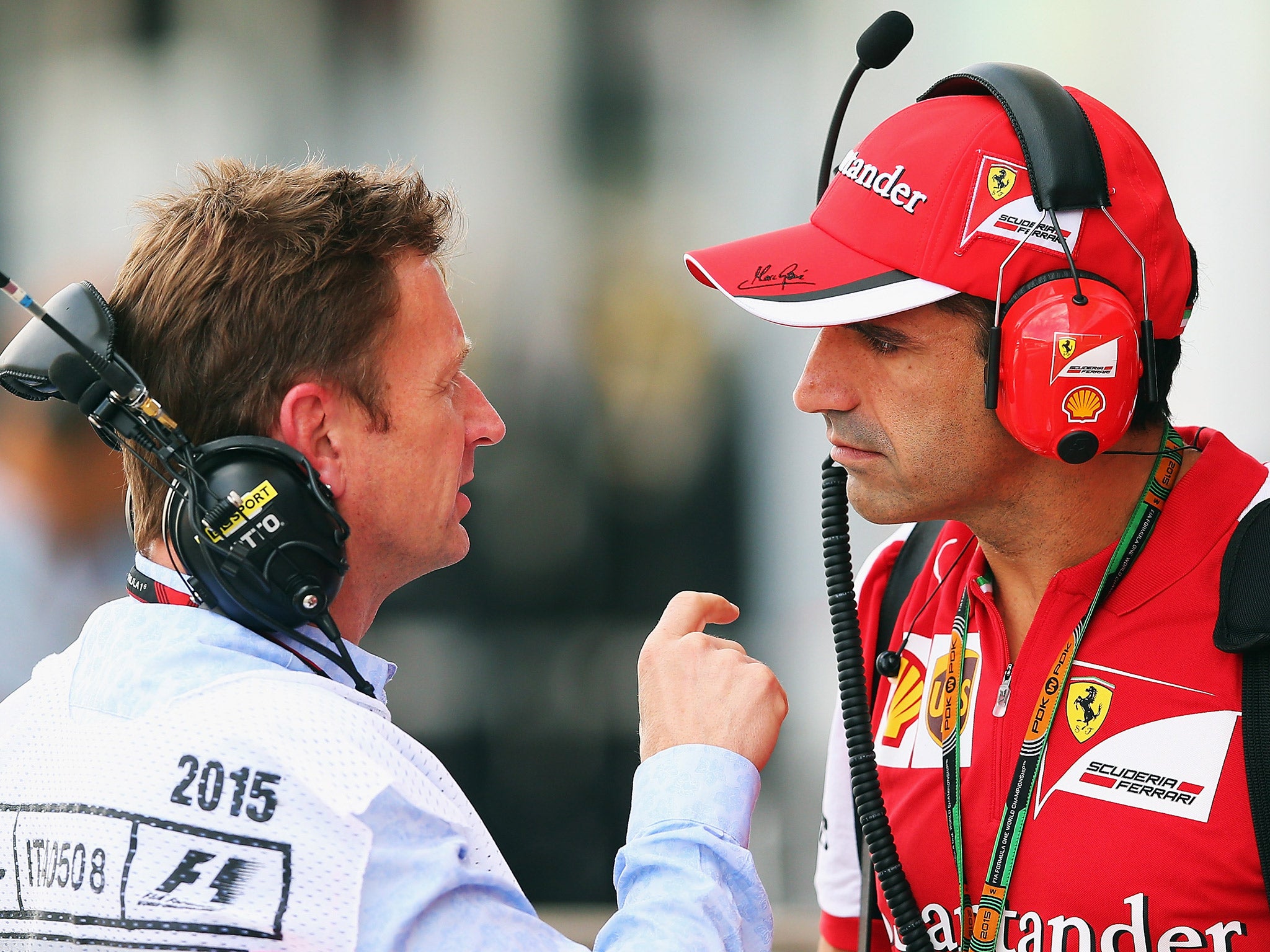
Yet none of this all-round ability would have been enough, according to McNish, without the dedicated support of his family. He speaks candidly about the emotional and financial toll that his sporting career took upon his own parents. They split when he was 15 years old. He attributes their split partly to the pressure of losing their weekends to chauffeuring him around the UK to karting competitions as well as spending their week nights in stripping down, checking and fixing his car. His family was not alone. Nigel Mansell’s family mortgaged their house to finance his driving career.
“If Nigel hadn’t made it, they would have been living in the back of a car,” says McNish.
As he bites into his melting blue-cheese burger, McNish evokes his three most memorable races. He starts with his first win in the grey beach town of Morecombe in 1982. I can picture the goofy, 12-year-old boy holding up his small trophy smiling as he stands out from the crowd for the first time. It’s the moment that he discovers the purpose that will persevere through all the ups and downs to success. The second race he describes is his final race in China in 2013 when he won the FIA World Endurance Championship. I can feel him driven on by a ruthlessness not to leave by the back door; not to come second as he had done in the previous year’s championship. Finally I can feel his relief in winning, in finishing his racing days on a high.
The third race McNish tells me about was the win that changed his career path in 1998 at Le Mans. He’s racing with Porsche through the night. It’s nip-and-tuck with Toyota when a technical failure drives him into the pits. At 6am in the pits, he contemplates failure. 30 seconds is all it takes for a Le Mans victory to pass through your grasp. Then he gathers his grit and turns the race around and wins. The 28-year-old McNish is back on the map and the defeated Toyota are begging him to join their Formula One team.
The ultimate endurance test, 24 Hours of Le Mans is the race that made him. McNish won not once, but three times. Due to its open regulations, the race has also played a key role in trialing road-car technology. The integration between racing and the road is one-to-one with manufacturers such as Audi. Long gone are the days of V16 (16 cylinder) engines as racing cars have evolved into lightweight single turbo V6 engines with better efficiency so less fuel stops. Diesel systems, direct injection and hybrid systems have all been tested at Le Mans.
Technological advances have eased the many environmental and safety issues surrounding motorsports. Yet while governments have leant support, petrolheads have proved harder to win over. The eco-friendly Formula E has yet to gain widespread buy-in and a new Red Bull safety canopy (a windscreen in front of the driver’s head) was recently dubbed as ugly.
“Some fans look at things from an aesthetic point of view, but I think it’s easy to look back with rose-tinted spectacles on the dangers of motor-racing in the past,” says McNish.
Having seen close colleagues retiring from racing due to head injuries (often after repeated concussions), McNish welcomes any safety innovation. He reflects upon the first time he drove a Formula One car. His shoulders stuck above the cockpit, while the pressure of the G-forces on his heavily helmeted head was unbearable.
“At the end of 20 laps, my head fell off,” he says. “I was like a nodding dog.”
Deaths in motor racing were common back then. Yet it took the infamous Black Weekend at Imola in 1994 when not one, but two Formula One drivers died (Ayrton Senna and Roland Ratzenberger) for motor racing to put safety as a top priority. The Grand Prix Drivers’ Association was re-established. Cockpits were raised to head height. Wheel tethers were improved and helmets became lighter reducing the need for ear-lobe-to-shoulder neck muscles. Investment was made into pre-emptive medical care. Looking back on his 32-year career with its inevitable off-days, McNish believes that these improvements saved his life.
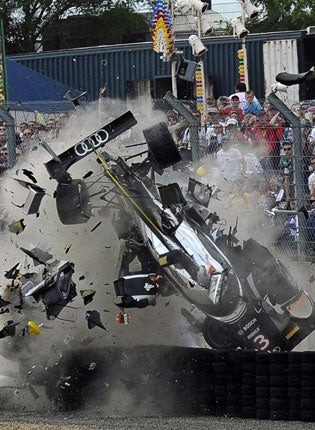
“If things hadn’t changed, I would have been five foot tall or not here at all,” he says.
I ponder whether advancements in car technology have weighted results towards the dominance of manufacturers over individual drivers. According to McNish, the lines are blurred as the best drivers gravitate naturally towards the best manufacturers, engineers, mechanics and teammates.
“You have periods where a team win because they’re the best,” he says. “Everyone else has to catch up. That is the evolution of sport. You have similar cycles of dominance in football. Chelsea took over from Manchester United. Then there’s a surprise like Leicester City.”
When he was too weak to race cars, he became British off-shore powerboat champion instead. He proved himself literally to be a man of stone
Munching on thick chips, we turn to McNish’s portfolio career since his retirement in 2013. Firstly, he’s a brand ambassador and strategic advisor for his longtime racing manufacturer Audi (who also own Ducati and Lamborghini). Secondly, he’s a commentator for the BBC. Although it’s an apt media outlet for the British-centric motorsports and Formula One, there has been recent controversy over Formula One’s TV pullout from the BBC (2016 will be broadcast on BBC Radio Five Live, with TV highlights on Channel 4). It’s a job that he describes as fun: “You’re in the paddock talking about the people you’ve grown up with. If you were at home, you’d be shouting at the TV”.
Finally he’s a manager to two up-and-coming British racing drivers: Ford GT driver Harry Tincknell and Formula Two winner Dean Stoneman. He speaks passionately about the latter’s fight with testicular cancer.
“When he was too weak to race cars, he became British off-shore powerboat champion instead,” says McNish. “He proved himself literally to be a man of stone.”
His management role is manifold: manager, mentor and agony aunt rolled into one. Sometimes he listens on the phone at midnight after a bad weekend race, other times he speaks candidly about their need to up their game. McNish admits that he has over-invested.
“It’s beyond business,” he says. “It’s like looking in the mirror and seeing myself 30 years ago.”
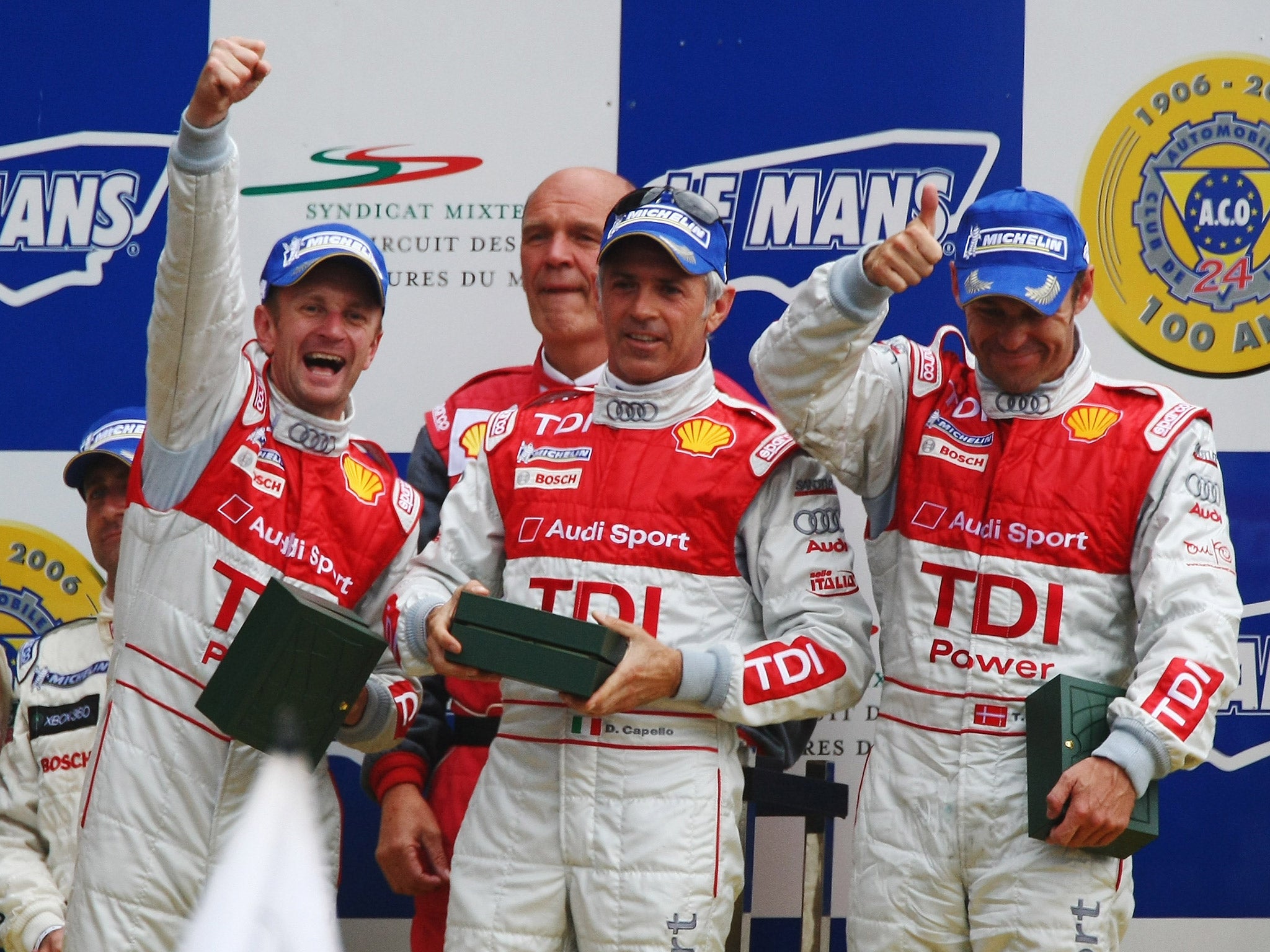
After we have said our farewells, I wander home along Port Hercule past sweat-beaded workmen piecing together a giant metal jigsaw puzzle into stands ready for the Grand Prix crowds. As I run through the two-hour interview in my head, I think of those who helped McNish along his drive to victory: from mentors such as Dumfries-born David Leslie and racing legends James Hunt and Jackie Stewart to his family including his beloved wife Kelly, his two children and his parents.
In his own generous words, McNish has made me realise: “You don’t make it to Formula One alone.”
McNish’s Tips for the 2016 Monaco Grand Prix
The Monaco Grand Prix is the world’s most famous and least understood Formula One race. It tightrope-walks the line between pure entertainment and pure sport. There are Versace-clad, champagne-glugging fans glimpsing a sports car through a balcony-top telescope. There are world-famous racing drivers slugging it out on Grand Prix’s tightest track.
“The thing about Monaco is there is no room for error,” says McNish. “If you’re not millimeter perfect, you crash.”
While there are few collisions with other cars, the narrowness of the track means that the slightest driver error ends in the crash barriers. Indeed Monaco holds the record for the fewest number of cars to cross the line (only three managed in 1996). Added to the physically demanding racetrack is the emotional toll of the unparalleled media attention.
“Every sponsor wants to be there so you spend your time shaking hands and smiling for photos,” says McNish. “It absorbs your energy when all you want to do is focus on the race. All in all it has thrown up some odd results in the past.”
Despite the unpredictable nature of the Monaco Grand Prix, McNish is happy to share his tips. In the GP2 races, he mentions up-and-coming Red Bull driver and French young gun, Pierre Gasling. In the Grand Prix itself, he favours homeboy Nico Rosberg with multiple wins on the Monaco track and six Grand Prix wins on the trot.
“Nico is riding on the crest of a wave so it’s tough to see who can beat him,” he says. “The one person who can beat him is Lewis Hamilton.”
Look out for McNish commentating on 2016 Monaco Grand Prix for BBC’s Five Live.

Louise Simpson (www.louisesimpson.net) is a Monaco-based travel and lifestyle writer. Since studying French literature at Cambridge University, Louise has written for The FT, The Times and Condé Nast in the UK and for Zagat, Frommer's and Google in the US. She is also a columnist for Monaco's national news site, Monaco Life.
Join our commenting forum
Join thought-provoking conversations, follow other Independent readers and see their replies
Comments